

Stanisław Lem. Polish science fiction author, futurologist 1921—2006) Stanisław Herman[2] Lem (Polish: [staˈɲiswaf ˈlɛm] ( Translating his works is difficult due to Lem's elaborate neologisms and idiomatic wordplay.
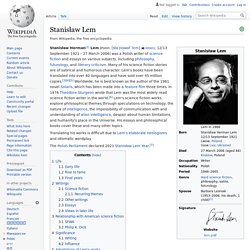
The Polish Parliament declared 2021 Stanisław Lem Year.[7] Life[edit] Early life[edit] House No. 4 on Bohdan Lepky Street in Lwów, where, according to his autobiography Highcastle, Lem spent his childhood. 'Pataphysics. Philosophy or pseudophilosophy that concerns what lies beyond metaphysics.
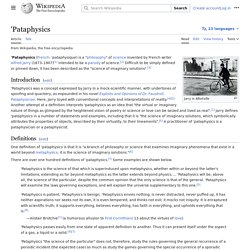
Logia. The term logia (Greek: λόγια), plural of logion (Greek: λόγιον), is used variously in ancient writings and modern scholarship in reference to communications of divine origin.
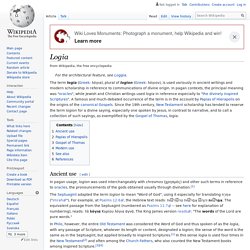
In pagan contexts, the principal meaning was "oracles", while Jewish and Christian writings used logia in reference especially to "the divinely inspired Scriptures". A famous and much-debated occurrence of the term is in the account by Papias of Hierapolis on the origins of the canonical Gospels. Since the 19th century, New Testament scholarship has tended to reserve the term logion for a divine saying, especially one spoken by Jesus, in contrast to narrative, and to call a collection of such sayings, as exemplified by the Gospel of Thomas, logia. Ancient use[edit] Allegory. Literary device As a literary device, an allegory is a metaphor in which a character, place or event is used to deliver a broader message about real-world issues and occurrences.
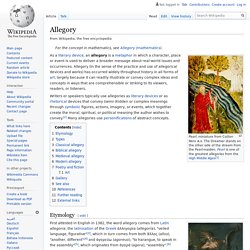
Allegory (in the sense of the practice and use of allegorical devices and works) has occurred widely throughout history in all forms of art, largely because it can readily illustrate or convey complex ideas and concepts in ways that are comprehensible or striking to its viewers, readers, or listeners. Writers or speakers typically use allegories as literary devices or as rhetorical devices that convey (semi-)hidden or complex meanings through symbolic figures, actions, imagery, or events, which together create the moral, spiritual, or political meaning the author wishes to convey.[2] Many allegories use personifications of abstract concepts.
Hyperbaton. Hyperbaton /haɪˈpɜːrbətɒn/ in its original meaning is a figure of speech where a phrase is made discontinuous by the insertion of other words.[1] In modern usage the term is also used more generally for figures of speech that transpose the natural word order in sentences[2][3] (also called anastrophe).[4] Etymology[edit] "Hyperbaton" is a word borrowed from the Greek hyperbaton (ὑπέρβατον), meaning "stepping over", which is derived from hyper ("over") and bainein ("to step"), with the -tos verbal adjective suffix.
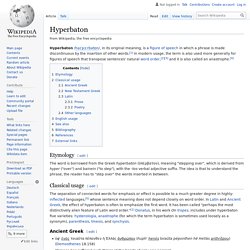
The idea is that to understand the phrase, the reader has to "step over" the words inserted in between. Classical usage[edit] Greek[edit] Alliteration (Latin) Alliteration was a prominent feature of Latin literature (in contrast to Greek), especially in poetry in the 3rd to 1st centuries BC, and continued to be used by some writers even in the Middle Ages.

Mārs PaTer, Tē Precor quaesōque utī siēs volēns ProPiTius "Father Mars, I pray and beg you. Alliteration. Repetition of consonant sounds in literature In literature, alliteration is the conspicuous repetition of identical initial consonant sounds in successive or closely associated syllables within a group of words, even those spelled differently.[1][2][3][4] As a method of linking words for effect, alliteration is also called head rhyme or initial rhyme.[5] For example, "humble house," or "potential power play.
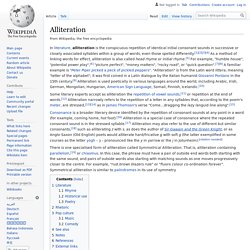
"[6] A familiar example is "Peter Piper picked a peck of pickled peppers". Halid Ziya Uşaklıgil - Vikipedi. Halid Ziya Uşaklıgil (1866 – 27 Mart 1945), Servet-i Fünûn ve Cumhuriyet dönemi Türk romancı ve yazar.
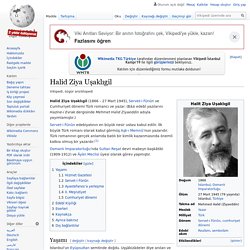
Anakronizm - Vikipedi. Anakronizm, herhangi bir olay ya da varlığın içinde bulunduğu zaman dilimi (dönem) ile kronolojik açıdan uyumsuz olması.
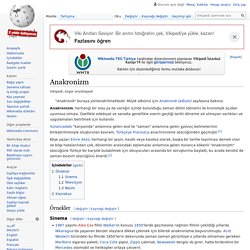
Özellikle edebiyat ve sanatta genellikle eserin geçtiği tarihi döneme ait olmayan varlıkları ve uygulamaları belirtmek için kullanılır. Lucian. 2nd-century satirist and rhetorician Lucian of Samosata[a] (c. 125 – after 180 AD) was an Assyrian[1] satirist and rhetorician[2] who is best known for his characteristic tongue-in-cheek style, with which he frequently ridiculed superstition, religious practices, and belief in the paranormal.
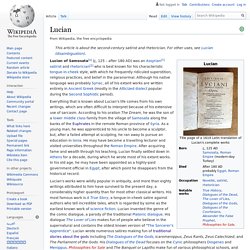
Altıncı Koğuş - Vikipedi. A. C. Bradley's Shakespearean Tragedy. A. C. Bradley. 20th-century English literary scholar Andrew Cecil Bradley in 1891 Andrew Cecil Bradley, FBA (26 March 1851 – 2 September 1935) was an English literary scholar,[1] best remembered for his work on Shakespeare. The Pilgrim's Progress. The Pilgrim's Progress from This World, to That Which Is to Come is a 1678 Christian allegory written by John Bunyan. It is regarded as one of the most significant works of religious, theological fiction in English literature.[1][2][3][4] It has been translated into more than 200 languages, and has never been out of print.[5][6] It has also been cited as the first novel written in English.[7] Bunyan began his work while in the Bedfordshire county prison for violations of the Conventicle Act of 1664, which prohibited the holding of religious services outside the auspices of the established Church of England.
The English text comprises 108,260 words and is divided into two parts, each reading as a continuous narrative with no chapter divisions. The first part was completed in 1677 and entered into the Stationers' Register on 22 December 1677. Metafiction. History of the term[edit] The term 'metafiction' was coined in 1970 by William H. Gass in his book Fiction and the Figures of Life.[4] Gass describes the increasing use of metafiction at the time as a result of authors developing a better understanding of the medium. This new understanding of the medium led to a major change in the approach toward fiction. Sophocles. Ancient Athenian tragic playwright Life[edit] A marble relief of a poet, perhaps Sophocles Sophocles, the son of Sophilus, was a wealthy member of the rural deme (small community) of Hippeios Colonus in Attica, which was to become a setting for one of his plays, and he was probably born there.[2][7] Sophocles was born a few years before the Battle of Marathon in 490 BC: the exact year is unclear, although 497/6 is the most likely.[2][8] Sophocles was born into a wealthy family (his father was an armour manufacturer) and was highly educated.
Sophocles' first artistic triumph was in 468 BC, when he took first prize in the Dionysia theatre competition over the reigning master of Athenian drama, Aeschylus.[2][9] According to Plutarch, the victory came under unusual circumstances. Instead of following the usual custom of choosing judges by lot, the archon asked Cimon and the other strategoi present to decide the victor of the contest. Saul Bellow. Nausea (novel) Novel by Jean-Paul Sartre In 1964 Sartre was awarded the Nobel Prize for literature, but he ultimately declined to accept it. The Nobel Foundation recognized him "for his work which, rich in ideas and filled with the spirit of freedom and the quest for truth, has exerted a far-reaching influence on our age. " Sartre was one of the few people to have declined the award, referring to it as merely a function of a bourgeois institution.
The novel has been translated into English at least twice, by Lloyd Alexander as The Diary of Antoine Roquentin (John Lehmann Limited, 1949) and by Robert Baldick as Nausea (Penguin Books, 1965). Preah Khan. Preah Khan (Khmer: ប្រាសាទព្រះខ័ន; "Royal Sword") is a temple at Angkor, Cambodia, built in the 12th century for King Jayavarman VII to honor his father.[1]:383–384,389[2]:174–176 It is located northeast of Angkor Thom and just west of the Jayatataka baray, with which it was associated. It was the centre of a substantial organisation, with almost 100,000 officials and servants. The temple is flat in design, with a basic plan of successive rectangular galleries around a Buddhist sanctuary complicated by Hindu satellite temples and numerous later additions.
Like the nearby Ta Prohm, Preah Khan has been left largely unrestored, with numerous trees and other vegetation growing among the ruins. Angkor. Former capital city; region of Cambodia Angkor (Khmer: អង្គរ pronounced [ʔɑŋ.ˈkɔː], lit. capital city)[1][2] was the capital city of the Khmer Empire, also known as Yasodharapura (Khmer: យសោធរបុរៈ; Sanskrit: यशोधरपुर) and flourished from approximately the 9th to 15th centuries. Angkor was a megacity, supporting at least 0.1% of the global population during 1010–1220. The city houses the magnificent Angkor Wat, one of Cambodia's popular tourist attractions. The word Angkor is derived from the Sanskrit nagara (नगर), meaning "city".[3] The Angkorian period began in AD 802, when the Khmer Hindu monarch Jayavarman II declared himself a "universal monarch" and "god-king", and lasted until the late 14th century, first falling under Ayutthayan suzerainty in 1351.
A Khmer rebellion against Siamese authority resulted in the 1431 sacking of Angkor by Ayutthaya, causing its population to migrate south to Longvek. Historical overview[edit] Seat of the Khmer Empire[edit] Saudade. Saudade was once described as "the love that remains" after someone is gone. Saudade is the recollection of feelings, experiences, places, or events that once brought excitement, pleasure, well-being, which now triggers the senses and makes one live again.
It can be described as an emptiness, like someone (e.g., one's children, parents, sibling, grandparents, friends, pets) or something (e.g., places, things one used to do in childhood, or other activities performed in the past) that should be there in a particular moment is missing, and the individual feels this absence. Audiences will be immersed in the drama of Quantum's catered affair, 'Tamara' If you ever wanted to follow actors around while watching a juicy drama unfold, here’s your chance to be a human camera. Émile Benveniste. Émile Benveniste (French: [bɛ̃venist]; 27 May 1902 – 3 October 1976) was a French structural linguist and semiotician. Christoph Martin Wieland. Home. Anlatı - Vikipedi. Anlatı veya kıssa; roman, hikâye, masal, senaryo vb. kurgusal veya kurgusal olmayan edebî türlerde bir olay dizisini anlatma biçimidir. Anlatı insan yaratıcılığının ve toplumu etkileme sanatının bir yüzüdür. Satire.
Hiciv - Vikipedi. 1814 yılında basılan, "l'Le hiciv e di S. Orazio Flacco epistole". Pikaresk roman - Vikipedi. Cervantes WWW Links. Shakespeare Study Guide. Shakespeare's Use of Allusions. Asimov's Guide to Shakespeare. Portia Hypothesis. Luigi Tansillo. Asli erdoğan. Aslı Erdoğan - Vikipedi. Konstantinos kavafis. Comte de Lautréamont. Jean Genet - Vikipedi. Sait Faik Abasıyanık - Vikipedi. Michael Ventris. List of metafictional works. Pierre Menard, Author of the Quixote. Thomas Pynchon. Metafiction. Üstkurmaca - Vikipedi. Don Quixote. Miguel de Cervantes.
Magic realism. Gabriel García Márquez - Vikipedi. H. G. Wells. Joseph Conrad. Stéphane Mallarmé. The Wind Rises: a flight into Hayao Miyazaki's magic and poetry. Dante Lab at Dartmouth College: Reader. Little Gidding (poem) Ezra Pound. Will the real Pessoa please stand up - Haaretz - Israel News. Will the real Pessoa please stand up - Haaretz - Israel News. Fernando Pessoa. Pygmalion (play) Paradise Lost. Faust. Henrik Ibsen. Mikhail Lermontov. Doctor Faustus (play) Conrad Aiken. Sortes Vergilianae. The Malcolm Lowry Project: Under the Volcano.
Poète maudit. Braille. Dante Gabriel Rossetti. Weltschmerz. Edip CANSEVER - Basim Dönüyor Ikimizden. Italo Svevo. Leitmotif. The Anxiety of Influence. The Anxiety of Influence. Harold Bloom. The Magic Mountain. Person from Porlock. Oliver Wendell Holmes Sr. Umit Yasar. Modern Library's Choices. Richard Bach, fully Richard David Bach. Richard Bach. Chekhov's gun - Wikipedia. In Rebus: Use the Power of Latin! Latin mottos - Generator of custom Latin phrases! List of Latin phrases - Wikipedia. Omar Khayyam - Wikipedia. Creative Writing Techniques. The Savage Experiment: Arthur Rimbaud and Paul Verlaine. Steganography - Wikipedia. Lebriz.com - Lebriz Sanal Dergi. Hiçlikte Bir An: Melankolik Aylak. Lebriz Sanal Dergi - Zamansız Kent Gezgini: Flâneur. Benjamin’in Pasajlar’ında Aylak Adam’ı Okuma Denemesi. Benjamin’in Pasajlar’ında Aylak Adam’ı Okuma Denemesi.